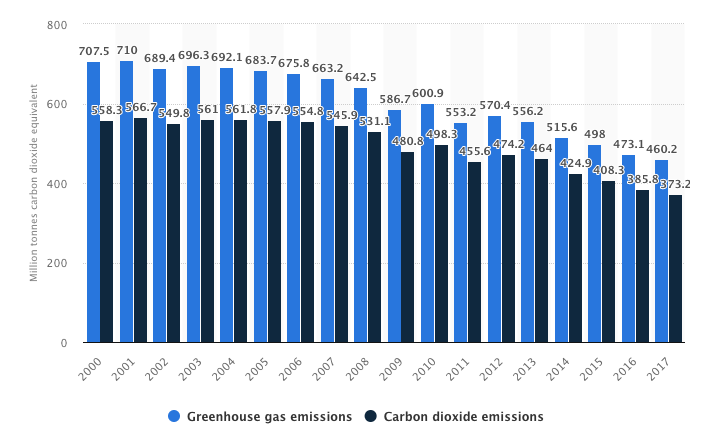These campaigners want to give a quarter of the UK back to nature

Green space, habitats and climate. Image: REUTERS/Toby Melville

Get involved with our crowdsourced digital platform to deliver impact at scale
Stay up to date:
Future of the Environment
Environmentalists in the UK want to return a quarter of the country to the wild, in a bid to absorb carbon dioxide to help combat climate change.
The proposal is in is a report by environmental group Rewilding Britain which promotes the benefits of restoring and protecting natural environments such as forests and wetlands.
The report suggests returning an area of 6 million hectares of land – roughly three times the size of Wales – to nature, which it says would remove up to 47 million tonnes of CO2 from the atmosphere each year as the new plants absorb carbon.

As the chart above shows, the UK is reducing greenhouse gas emissions, but they remain a major cause of climate change. The rewilding plan could neutralise more than a tenth of the UK’s emissions, the report says.
Returning such a huge area of land to nature would also improve biodiversity. According to a report by the Intergovernmental Science-Policy Platform on Biodiversity and Ecosystem Services, up to 1 million species worldwide are threatened with extinction.
Rewilding Britain says its plan would also protect communities at risk of flooding, improve water quality and have benefits for health and wellbeing by bringing people closer to nature.
How much will it cost?
The report estimates a $2.4 billion investment would be required to carry out the plan. A subsidy system would pay landowners per-hectare to restore ecosystems.
The policy would require a bold political shift and is likely to have many opponents. On a much smaller scale, the UK government plans to plant more than 130,000 trees across the country, working towards a target of 1 million new trees by 2022.
Action on climate change
Recent protests across London by environmental movement Extinction Rebellion, and a visit to the UK by Swedish student activist Greta Thunberg, have raised public awareness of the climate crisis, and focused attention on the need for urgent action.
The UK parliament declared an environment and climate emergency and the government’s Committee on Climate Change recommended a UK greenhouse gas emissions target of net-zero by 2050. If adopted, this target would be one of the most ambitious long-term emissions commitments of any major economy, but would require big efforts to achieve.
Don't miss any update on this topic
Create a free account and access your personalized content collection with our latest publications and analyses.
License and Republishing
World Economic Forum articles may be republished in accordance with the Creative Commons Attribution-NonCommercial-NoDerivatives 4.0 International Public License, and in accordance with our Terms of Use.
The views expressed in this article are those of the author alone and not the World Economic Forum.
Related topics:
The Agenda Weekly
A weekly update of the most important issues driving the global agenda
You can unsubscribe at any time using the link in our emails. For more details, review our privacy policy.
More on Nature and BiodiversitySee all
Dan Lambe
April 24, 2024
Roman Vakulchuk
April 24, 2024
Charlotte Kaiser
April 23, 2024
Jennifer Holmgren
April 23, 2024
Agustin Rosello, Anali Bustos, Fernando Morales de Rueda, Jennifer Hong and Paula Sarigumba
April 23, 2024
Carlos Correa
April 22, 2024






